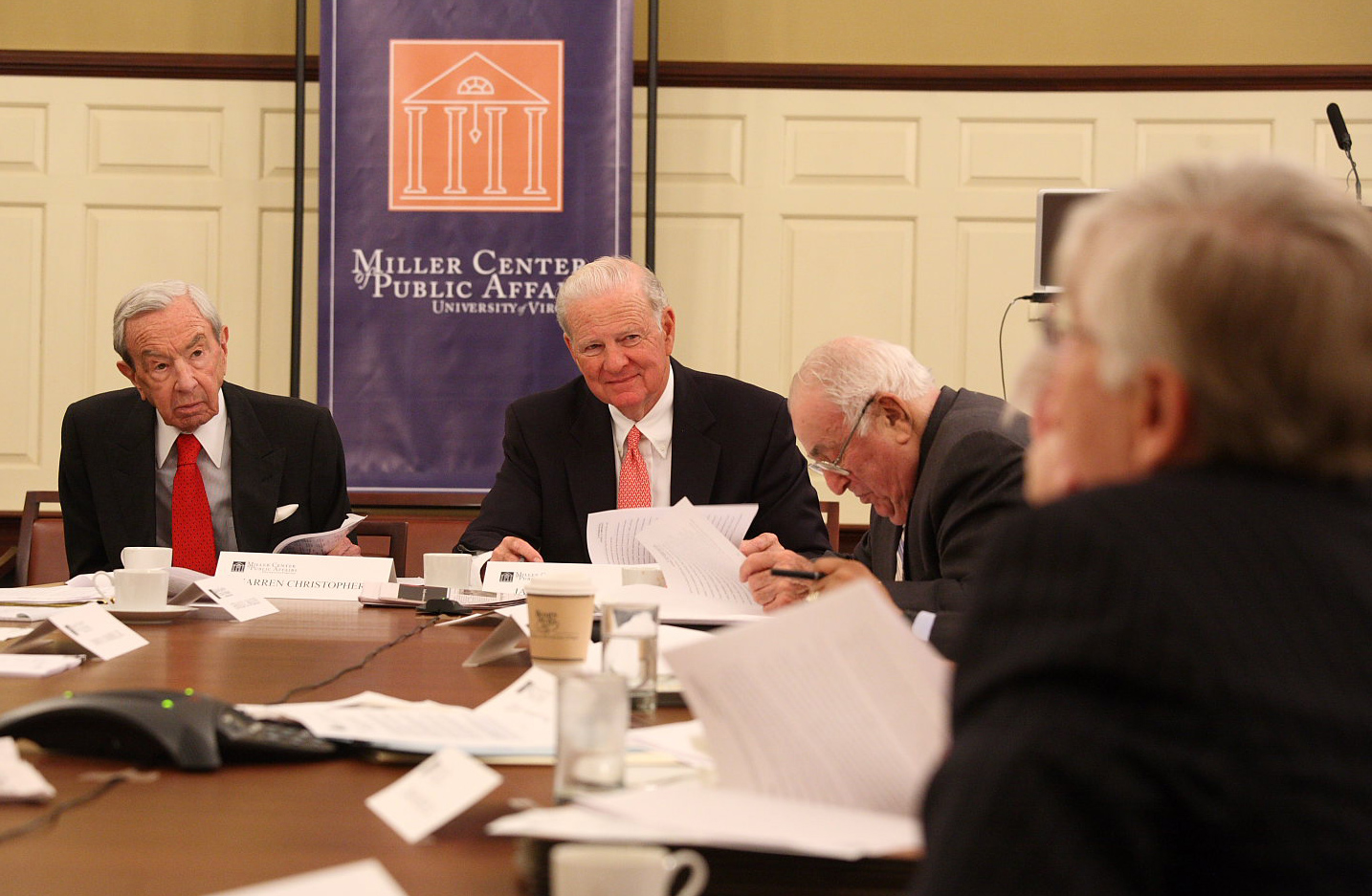Video: McCain on U.Va. Miller Center
Video: Kaine on U.Va. Miller Center
U.S. Sens. Tim Kaine (D-Va.) and John McCain (R-Ariz.) introduced legislation today that would reform the 1973 War Powers Resolution by strengthening the consultative process between Congress and the president on whether and when to engage in military action. The War Powers Consultation Act of 2014 is based on the 2008 recommendations of the University of Virginia Miller Center’s National War Powers Commission, a group co-chaired by former Secretaries of State James Baker and Warren Christopher, which examined the process by which the United States decides to go to war.
The National War Powers Commission report is available here.
“I am heartened to see that Senators McCain and Kaine have introduced what essentially is the draft legislation recommended by the National War Powers Commission,” Baker said. “I am confident the politically diverse members of our bipartisan commission are equally encouraged, as would be my friend and commission co-chair, the late Secretary of State Warren Christopher.
“The decision to send America’s men and women into battle is the most important one that the president makes. The approach that the two senators are now advocating increases the chances that presidents and Congress will consult meaningfully and deliberate before committing the nation to war. I hope that the Obama administration will support their efforts to make it law.”
Gov. Gerald L. Baliles, director and CEO of the Miller Center, said, “Words of war are cheap. Wars themselves are not. They have consequences and should not be entered into without informed discussion between the White House and Congress. The War Powers Consultation Act of 2014 provides a pragmatic, bipartisan approach to deal with a problem that has bedeviled a host of presidents and the Congress for more than 200 years.”
Along with Baker and Christopher, commission members included: Slade Gorton, former U.S. senator from Washington; Lee H. Hamilton, former U.S. representative from Indiana; Carla A. Hills, former U.S. trade representative; John O. Marsh Jr., former Secretary of the Army; former U.S. Attorney General Edwin Meese III; Abner J. Mikva, former chief judge of the U.S. Court of Appeals for the District of Columbia Circuit; J. Paul Reason, former commander-in-chief of the U.S. Atlantic Fleet; Brent Scowcroft, former national security advisor; Anne-Marie Slaughter, then dean of the Woodrow Wilson School of Public and International Affairs at Princeton University; and Strobe Talbott, president of the Brookings Institution.
John C. Jeffries Jr., then dean of the University of Virginia School of Law, and W. Taylor Reveley III, then dean of William & Mary Law School, now president of the College of William & Mary, served as co-directors of the commission.
The War Powers Consultation Act of 2014 would:
- Repeal and replace the 1973 War Powers Resolution.
- Codify the consultative process between Congress and the President on whether and when to initiate military action. Under the Act, the President must consult with Congress before ordering deployment into a “significant armed conflict,” or combat operations lasting, or expected to last, more than seven days. This would exclude humanitarian missions and covert operations (which are covered by another statutory scheme). In addition, if secrecy or other emergent circumstances preclude prior consultation, consultation may be deferred but must be undertaken within three days.
- Create a permanent Joint Congressional Consultation Committee in Congress that would consist of majority and ranking members of the national security committees (Armed Services, Foreign Relations, Intelligence and Appropriations) and the leader and ranking member in each House of Congress to ensure there is a timely exchange of views between the legislative and executive branches, not just notification by the executive. Committee members would have access to regular information on the process and the substance of national security matters and would meet with the president periodically.
- Detail Congressional procedures requiring that all members take a vote of support or opposition for any significant military action (seven days or more) within 30 days. Under the act, all members of Congress would eventually be asked to vote on decisions of war in order to ensure a deliberate public discussion in the full view of the American public, increasing the knowledge of the population and the accountability of our elected officials.
Media Contact
Article Information
January 16, 2014
/content/miller-center-report-forms-basis-new-war-powers-act-us-senate

